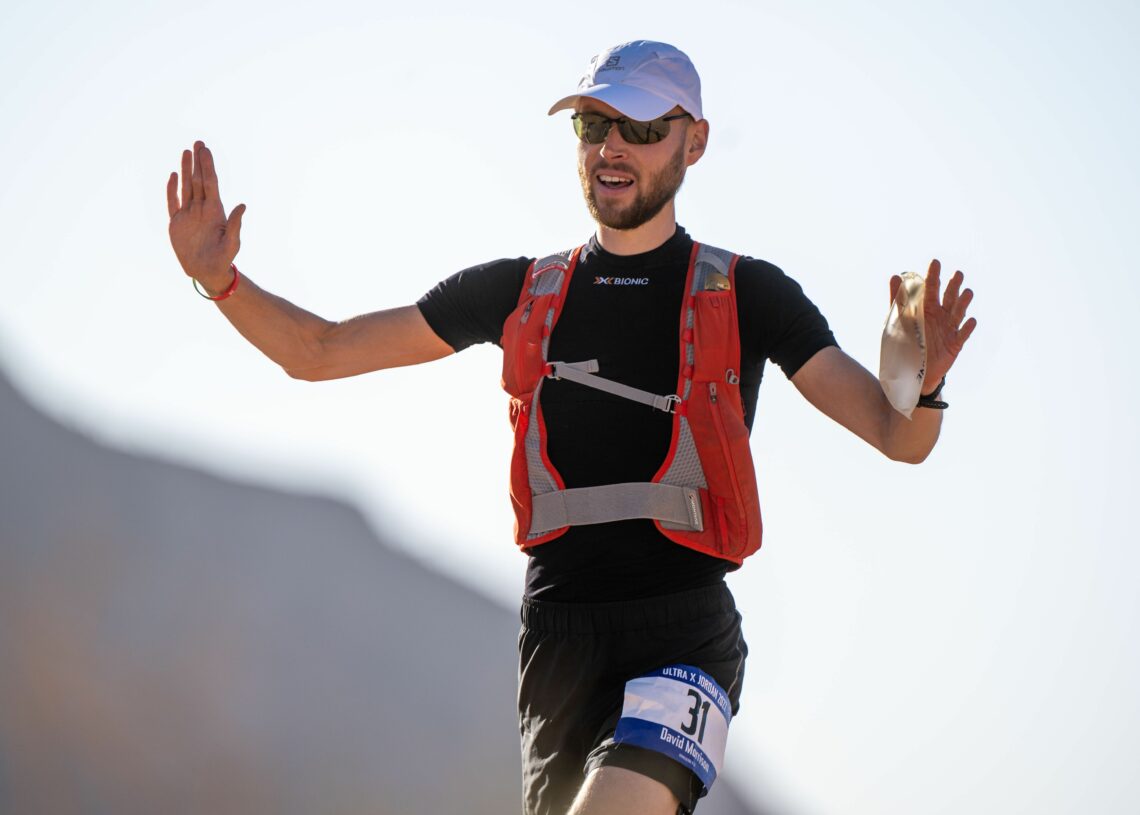Studies have shown that 13.5% of elite athletes show a prevalence of eating disorders. Athletes are at greater risk if their sport focuses on personal performance, appearance, diet and weight requirements.
Fitness enthusiast and adventurer David Morrison overcame an eating disorder and is raising awareness and education through his challenges.
Working in recruitment for an airline company has meant he has travelled the world; however, he has switched out the 5km for world-class ultramarathon races.

“I experienced shorter runs when I was younger, from 5km to 10km, in between my main hobbies at the time, football and tennis,” he said.
“But once injuries began to take their toll and work had me based in many locations, I began to focus on longer runs. I had always wanted to do a half marathon and go on to do a full marathon.
“This came to fruition in 2018 when I signed up for the Sahara Challenge organised by Ultra Challenge. This comprised two marathons in the Sahara Desert, with temperatures around 42 degrees Celcius.”
In the build-up to his run across the Sahara, Morrison was doing minor fundraising but is aiming to make his fundraising goals higher and higher in the future.
“I like to set myself a challenge,” he explained.
“I enjoy seeing what we are all capable of, and these past few years have seen me doing more significant challenges to see how my body can handle the physical demands.
“However, I also want to set myself a mental hurdle to overcome. That’s not to say an ultra doesn’t demand mental toughness and prowess, but it is a different challenge to contend with.”
Morrison explains that he wants his race to put other people first; he aims to influence the lives of others who may also be struggling. He seeks to help and assist in funding others to provide the necessary resources and services to support those who may also suffer from eating disorders.
Statistics for the UK state that almost 6.5% of the population suffers from an eating disorder, close to half a million people.
Last year Morrison overcame a massive hurdle, publicly announcing he suffers from an eating disorder.
“Anyone who faces this or any other mental illness will know it is a challenging topic to open up about and share with others. Especially when food, health and nutrition are essential in my life.
“Over a number of years, I have experienced increasingly more side effects which have hindered many parts of both my sporting performance and personal life. These range from a functional digestive disorder, sleep disruption, low energy availability, depressed immune system and muscular fasciculations.
“My nervous system has been constantly on high alert, making it incredibly difficult to regulate and evaluate the real issues at play emotionally. Becoming underweight had never been intentional and goes unnoticed until others start speaking up about it around you.”
Eating disorders carry the damaging stigma of being a feminine condition; however, studies have shown that 19% of those suffering are male.
“Relative Energy Deficiency in sport (REDs) can be both intentional and unintentional,” he continued. “They both lead to dysfunctional behaviours when placed in the right psychological space. Unfortunately, there are far too many triggers in today’s society.
“Prejudices, judgements and behaviours today make it harder for us to seek the help that is needed – in particular in men where it can be viewed as not being ‘masculine’ to speak about our issues, and within sportspeople where REDS is a serious issue and is more commonplace than one may think.”
Sport’s Nutritionist Renee McGregor has spoken to us about the scientific nature of REDs and how dangerous they can be for long-distance runners and eating disorders in the sport.
Morrison has said that he is a massive foodie and loves trying new food from all different types of cuisine, but his relationship with food is still very complex.
“I will be honest in saying that it has been an incredibly lonely experience, one that saw me admitted to A&E last year due to dangerously low potassium levels.
“The scary part was that I still felt my usual self. A watershed moment in which I realised that I could not stop ignoring the red flags being waved in front of me and started taking the warning signs seriously.
“If I cannot look after myself and nourish my body with what it requires, then my body will simply be unable to serve me. Saying and doing are two different things, however.
“This is the reason why I wish to raise funds for Beat-ED, an eating disorders charity to provide support for those who are facing this battle. An eating disorder isn’t about one’s relationship with food but rather a form of communication. A way to express one’s psychological suffering. Let’s change this and help those accurately express themselves.”
Morrison has recently completed a 105km self-sufficient run with no aid or service; he did the race and route planning completely solo. He finished it within 11 hours, the longest distance he had covered in a single day. He persevered and reached his goal despite nearly throwing in the towel on different occasions.
“I will be resting up for the next few days with my next event based back in my hometown, the Wold Rangers Way Ultra,” he said.
“Later in the year, I will participate in the Race to the Stones, Race to the King, and Ultra X Scotland. I will also venture to Sweden for the Tribe Run for Love 5. I also have several more events lined up and plan to add a couple more to take me up to the 1200km target.”
Morrison has a Justgiving page with two charities:
- TalkED
- The Tribe Freedom Foundation